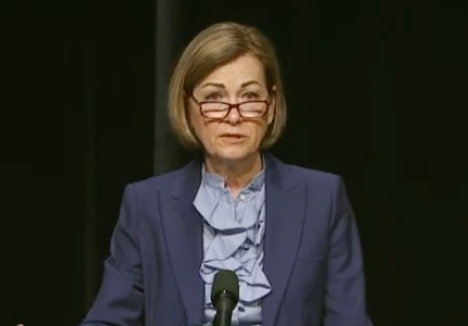Environmental advocates were relieved when the Iowa legislature adjourned without passing any bill to move Iowa’s water quality and monitoring programs from the Department of Natural Resources to the Iowa Department of Agriculture and Land Stewardship. However, Plan B to accomplish the same goal without legislative action took another step forward yesterday, when Chuck Gipp was named deputy director of the Iowa Department of Natural Resources.
Governor Terry Branstad’s administration advocated moving water programs to IDALS earlier this year, around the same time he stacked the Environmental Protection Commission with friends of agribusiness. Critics pointed out that the DNR had been praised for its efficient use of federal water quality funding. Moreover, it is illogical to move Clean Water Act compliance from a department that exists to “conserve and enhance our natural resources” to a department that exists “to encourage, promote, market, and advance the interests of agriculture.” Iowa House Republicans (assisted by some Democrats) approved a bill transferring some water programs to the agriculture department, but the proposal never cleared the Iowa Senate.
In May, Branstad’s DNR director Roger Lande announced major staff cuts, including three full-time and three contract positions solely focused on water monitoring. (Lande didn’t cut full-time employees from any DNR division besides the Geological and Water Survey Bureau.) At that time, DNR stream monitoring coordinator Mary Skopec warned, “This is definitely going to impact our ability to do data management and lake monitoring.” The cuts serve the interests of industrial agriculture, because collecting fewer samples from lakes and streams makes it less likely that any polluted waterway will be labeled “impaired.”
Gipp’s appointment looks like part of the same strategy to give agribusiness more control over how, when and where the DNR monitors Iowa waters. The deputy director handles a lot of day-to-day management for the large department. Gipp is a longtime dairy farmer and member of the Iowa Farm Bureau. He served in the Iowa House for 18 years, rising to the position of majority leader under Republican Speaker Chris Rants. He chose not to seek re-election in 2008, and Republican Secretary of Agriculture Bill Northey named him to head the IDALS Division of Soil Conservation. The Cedar Rapids Gazette reported,
Gipp, a lifelong dairy farmer who is respected in both production agriculture and environmental circles, said he hopes to foster understanding and cooperation between the two often-opposed groups.
“Both are important to Iowans, and we need to bring both sides together and strike a sustainable balance,” Gipp, 63, of Decorah, said.
It’s news to me that Gipp is respected in environmental circles. I can’t recall any instance of him using his authority as Iowa House majority leader to promote environmental protection. By all accounts Gipp did an adequate job overseeing soil conservation programs used by some farmers, but relying solely on voluntary measures (the Iowa Farm Bureau-approved method) hasn’t solved our water quality problems.
I recognize that Iowa state government will balance the DNR’s needs with those of the agriculture department, but that’s not what appears to be happening here. Having failed to move water programs to IDALS, the Branstad administration is giving IDALS substantial influence over DNR internal policies and practices. In a July 26 press release, Lande praised Gipp as “someone who is not only very dedicated and knowledgeable about conservation of our natural resources but also a very talented individual in working with our stakeholders and Legislature.” I hope Gipp proves me wrong, but I’m not encouraged to see him hired less than a week after the DNR’s top environmental regulator was pushed out the door.
UPDATE: Iowa Citizens for Community Improvement highlighted Gipp’s legislative votes against any meaningful regulation of factory farm pollution. Details are after the jump.
Continue Reading...


